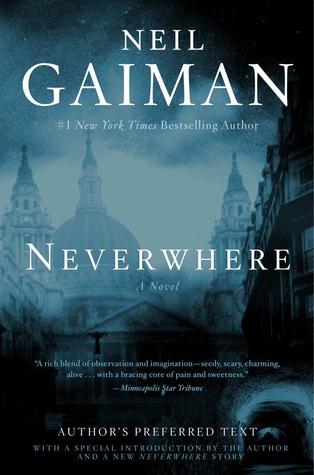I had tears in my eyes as I read the last few pages of Neverwhere, and I can’t fully express how much I adore this story. In rereading it I remembered all the reasons I loved this book when I first read it almost 10 years ago, and all the reasons Neil Gaiman became and remains one of my favourite authors. I felt like I was coming home to visit an old friend, and in conversation with them realising our relationship goes so much deeper than superficial pleasantries about comings and goings, and in fact it is founded on something rich and wonderful. As a 17 year old I loved the creative world Gaiman created, the colourful characters and vivid settings of London Below, I loved the sly humour and all of the puns. As a 26 year old I connected with Richard’s struggle between the pull of a ‘simple’ life that meets expectations, and the path less travelled that my heart tugs me towards.
Neverwhere is ostensibly a story about an Englishman, Richard, who is ordinary in every way. Living an ordinary life in London, with ordinary friends, and a girlfriend who kind of wishes he was a bit more ordinary. His life changes when he ‘falls through the cracks’ and into the mysterious London Below, and is swept away on an adventure with an assortment of unusual characters. It sounds relatively straightforward as fantasy tales go, but it is so much more than these bare bones. Gaiman’s wit and tenderness transform it into a deeply compelling and amusing story that draws on lots of traditional fairy tales (Alice in Wonderland is referenced directly more than once, as is Puss in Boots).
On a different note I am fascinated by Gaiman’s inclusion of diverse characters throughout Neverwhere. The Marquis & Hunter are people of colour, though their backgrounds not really explored, as are the Black Friars. Meanwhile Hunter’s sexuality is clear but not a topic of any particular focus. Did anyone else notice this throughout the novel? In a great blog post Laura Zats says “…literature is both imaginative and representative. It reflects who we are, and who we want to be”. She neatly sums up my thoughts on Gaiman’s ability to ensure that “race is just one facet of a person’s identity, just as it is in reality. He acknowledges it, but doesn’t let it become all a character is.” and I would extend this to sexual orientation as well.
For those of you who have not read many of Gaiman’s books this might seem like drawing a long conclusion from something which is not a huge deal in the book. But when you look at his body of work as a whole, Neverwhere being just the very first novel he published, and see these themes and approaches are running throughout regardless of genre or subject matter, to me that is the mark of a writer who truly understands just how important literature is in shaping how we see ourselves and how we understand the world. And it makes me glad that he writes, and is so widely read.
Neverwhere is one of those books that I love so much I will continue to recommend it to everyone who shows even a passing interest in reading a word printed on a page. However I should acknowledge that it is probably not for everyone. It has a very particular ‘British-ness’ about it, and the humour is very dry, it is a story of self discovery, not of glory, and there is no real romance to speak of. The world is not ‘well developed’ in the way YA fantasy readers of the recent trends in trilogies would expect, and you will definitely end the book with more questions than answers. But all of those things are things that I love about Neverwhere, and about Gaiman’s writing, and they are the reasons that Neverwhere will remain forever and always one of my favourite books.

